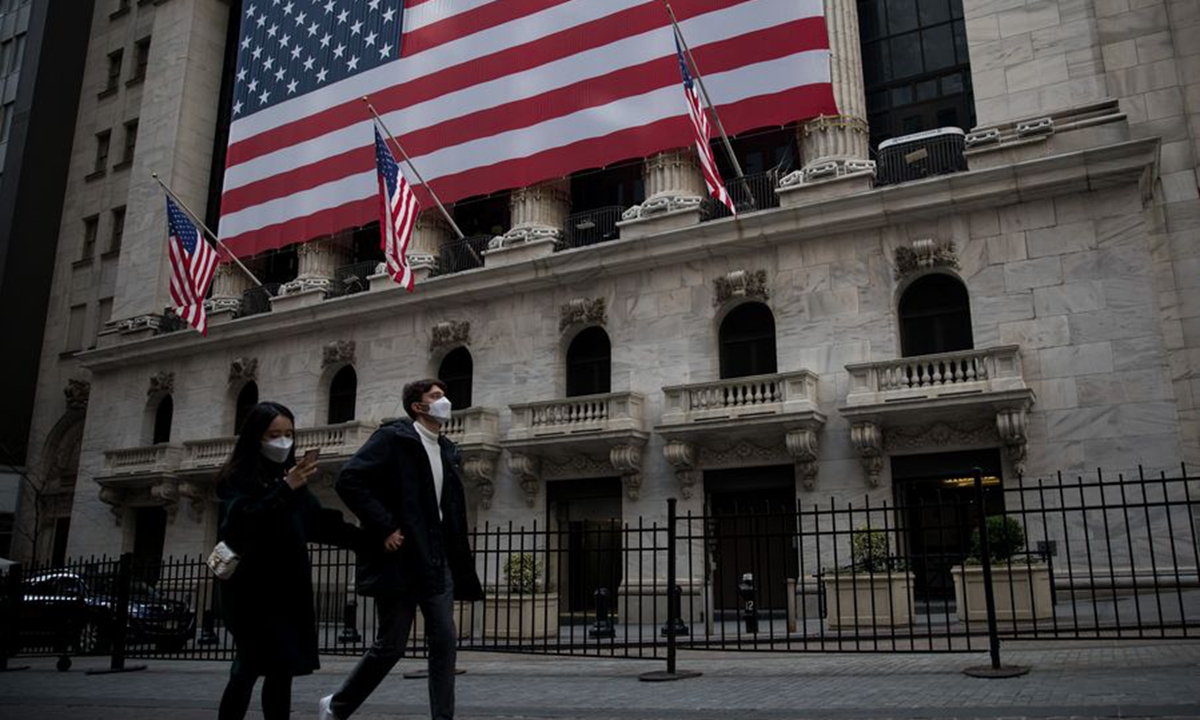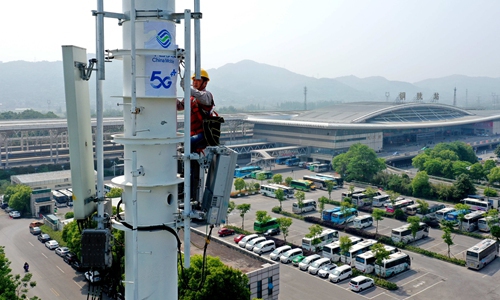China may ask US companies to reveal their military links after NYSE’s delisting of telco firms: expert
US stock crackdown risks reciprocal response

Pedestrians wearing face masks walk past the New York Stock Exchange in New York, the US, on March 18. Photo: Xinhua
Delisting of major Chinese telecom giants by the New York Stock Exchange (NYSE) will have a limited impact on these firms and other companies listed in the US market, and the Chinese government is expected to return in kind to the US for its crackdown on Chinese companies, with possible reciprocal requirement asking US companies doing business in China to reveal their links to the US military, Chinese analysts said on Monday.
Shares of China Mobile, China Telecom and China Unicom inched down in premarket trading on Monday after NYSE announced on Thursday (US time) that it has started the process of delisting the Chinese telecoms in move orchestrated by the Trump administration to crack down on Chinese businesses.
The move comes amid escalating tensions between the world's two largest economies in the financial sphere, from the US accusing China manipulating its currency to some global indexes companies' dropping of a number of Chinese firms from their component index.
NYSE's move was a response to an executive order by the Trump administration banning US investors from buying securities of the blacklisted companies - companies the Trump administration deems to have links to Chinese military - from November 2021.
Chinese securities industry experts said the US move is set to have limited impact on the business of the three telecom giants and other Chinese companies listed at US stock markets in general. However, they warned that the US crackdown on Chinese companies could have a consequence, and US companies could be asked to declare their links with the US military before allowed market access in China in the future.
Chen Da, executive director of Anlan Capital, said that the impact of delisting for the three Chinese telecom firms will be limited as the US market is not their major battleground for fund raising.
Chen said the US crackdown on Chinese companies in the securities sphere will not be boundless, and there are no foreseeable crackdowns to private-sector Chinese companies.
"The US has been careful in selecting which Chinese firms to target to meet its political agenda to hit China and not to cause collateral impact to its markets," Chen said.
Analysts said similar "small" impact is anticipated for CNOOC, China's largest offshore oil producer reported by Bloomberg to be at high risk facing similar fate, among other Chinese oil firms.
"The NYSE should compensate the loss of Chinese companies for its forced delisting for non-market reasons," said Dong Shaopeng, an advisor for the China Securities Regulatory Commission.
"And the Chinese government could apply the principle of reciprocity to US financial institutions and companies seeking access to the Chinese market, requesting transparency and asking them to reveal their dealings and links with US military and defense sector," Dong told the Global Times on Monday.
The US crackdown has drawn sharp barbs from Chinese authorities.
The China Securities Regulatory Commission, China's securities regulator, said on Sunday that the direct impact of the US move is "limited" and it will support for the companies to safeguard their interests according to law.
China's Ministry of Commerce on Saturday denounced the US move as "abusing the concept of national security" and said that it will take necessary measures to resolutely safeguard the legitimate rights and interests of Chinese enterprises.
Delisting of major Chinese telecom giants by the NYSE is a flagrant denial of the principles of market economy and fair competition, of which the US is a self-claimed "champion", a spokesperson of the China's Ministry of Foreign Affairs said on Monday.
Dong said that a concrete step has been taken toward China-US financial decoupling and such a step is taken against the voice of US and Chinese industrial and commercial circles and at the will of certain US politicians stubbornly carrying out anti-China policies.
"Even amid anti-China momentum, a more reasonable Biden administration, soon to take office, could better manage difference in the economic and financial sphere via more dialogues and engagement," Dong said.
It is hoped that insightful people in the US could push motions to rectify the over-politicizing of economic issues in the executive orders left by the Trump administration, Dong said.



